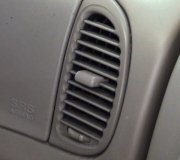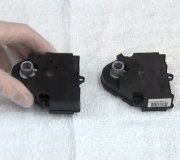If I were you bring it in-its probably more than only a leak that's going on here. Read below
The most likely cause of an automotive air conditioner cooling problem is no refrigerant in the system. If the refrigerant has escaped past a leaky compressor or O-ring seal, leaked out of a pinhole in the evaporator or condenser, or seeped out through a leaky hose, the leak needs to be identified and repaired before the system is recharged.
On many systems, the compressor will not turn on if the refrigerant is low because the "low pressure safety switch" prevents the compressor clutch from engaging if system pressure is low. This protects the compressor from possible damage caused by a lack of lubrication.
One of the first things you should check, therefore, is compressor engagement. If the compressors magnetic clutch is not engaging when the A/C is turned on, the problem may be a blown fuse or a wiring problem. If the fuse is blown, replacing it may restore cooling temporarily. But the underlying reason for the fuse blowing in the first place needs to be identified and corrected to prevent the same thing from happening again.
If the magnetic clutch is receiving voltage but is not engaging the compressor, the clutch is defective and needs to be replaced. If there is any evidence of leakage around the compressor shaft seal, the seal should also be replaced.
If the clutch works but fails to turn the compressor (the belt may squeal in protest!), The compressor has seized and needs to be replaced.
Compressor failures are usually the result of loss of lubrication, which in turn may be due to low refrigerant in the system, a blockage (such as a plugged orifice tube which prevents refrigerant and oil from circulating to the compressor), loss of lubricant due to leaks or improper service procedures (not adding oil to the system to compensate for oil lost through leakage or component replacement), or use of the wrong type of lubricant.
Friday, September 4th, 2009 AT 2:20 PM



